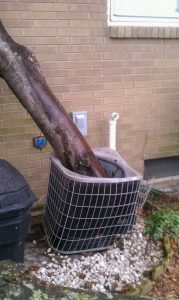The weather here in Aus can be pretty random and unfortunately, your air conditioner could receive the brunt force of our sometimes extreme weather. Thankfully there are a few things that you can do to protect your unit and ensure that it is in working order all throughout the year.
Here are the few common issues that affect air cons and what you can do to protect them:
Humidity
Air conditioning units are in a constant battle with humidity, and sometimes humidity gets the best of them. These systems are designed to remove moisture from the air in your home, so you can avoid that hot, sticky feeling.
However, this takes a lot of work, and if you’re using an old or poorly sized unit, the workload could be too much. This will cause wear and tear on your unit and raise your energy bill. Some warning signs that your unit is undersized for your home is a moist feeling in the air, a musty smell, or fog accumulation on windows.
If you notice any of these signs, call an air con technician to check your cooling system.
If replacing your unit isn’t in the budget, ask about a dehumidifier attachment. While this isn’t a permanent solution, it’s still beneficial to your system and can potentially lower your energy bill.
Heavy wind
Heavy winds can cause air conditioning problems. The damage caused by wind occurs when it throws debris at the condenser fan grill or carry small objects inside the unit, which can cause blade damage, blockage, and structural compromise.
Here are steps that you can take if you see severe winds in the forecast:
- Have a cover for your air conditioner on hand to keep out debris (but always ensure that it is an approved cover for your unit).
- Do not cover your unit with plastic wrap. This will cause corrosion by entrapping moisture.
- Remove the cover after the storm passes. Don’t run the unit with the cover on.
- Remove unsecured objects like patio furniture, tools, decorations, and toys from your yard, so the wind doesn’t throw them into your house or unit.
Flooding/heavy rain
While your air conditioning unit is designed to withstand even heavy rain, flooding can cause extensive damage to your cooling system. If rain build-up becomes higher than 6 to 8 inches, your outdoor A/C unit could be in trouble.
In these situations, it’s important to have a draining system leading water away from your home, so your air conditioner is never submerged.
While some owners prefer to apply a cover, the technique is optional. Rain can remove dirt and pollen from your unit, but you should never cover your unit with a plastic or trash bag.
After bad weather
After the bad weather has passed you should always check on our outdoor unit and ensure it is not damaged, however, if you want to be thorough we always advise that you get an air conditioner technician to just pop by and have a quick look.
Related Tag: Air Conditioning Repairs Perth

